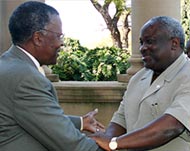Pretoria brokers Burundi deal
A power-sharing deal aimed at paving the way to elections in Burundi was signed by a majority of its parties but politicians from the Tutsi minority baulked at the accord.

Twenty of the 30 parties represented at the talks, brokered by South Africa, signed a document on Friday that would lead to elections in the war-torn central African nation.
“This is a decision taken by the majority of parties and therefore a decision taken for the Burundian people,” South African Deputy President Jacob Zuma said after the parties signed the deal in Pretoria.
The leader of the main Tutsi party, the Union for National Progress (UPRONA), Jean-Marie Manwangari, was among the 10 leaders who did not sign the deal.
“None of our concerns were taken into account,” Manwangari told AFP on his way back to Bujumbura.
The Tutsi leader said he planned to consult with his party members in Burundi to decide what to do next.
More than 300,000 people have died in Burundi since rebels from the Hutu majority took up arms in 1993 against the Tutsi-led government and army.
New elections
|
“Some make history. Some write history. |
The Arusha peace accord signed in 2000 set up a transitional government that is due to end its term on October 31, handing over power to a newly-elected president, parliament and local councils.
A major bone of contention has been the allocation of seats in the first parliament between the two ethnic groups with UPRONA arguing that it should get the full 40% set aside for Tutsis.
UPRONA maintains that Tutsis who have defected to Hutu-led parties should not be eligible for those seats.
A copy of the pact stated that the council of ministers will be 60% Hutu and 40% Tutsi while parliament would follow the same make-up apart from three lawmakers from the Twa ethnic group.
Thirty percent of the seats are earmarked for Burundian women.
The pact stipulated that the Senate would be 50% Hutu and 50% Tutsi with three Twa members.
It said the president would name two vice-presidents representing the two main ethnic groups.
Road to peace
Zuma, South Africa’s chief mediator on Burundi, made clear that the deal marked the end of the negotiation process and that leaders must now start preparing for elections.
The pact “allows the parties in Burundi to begin the process of drawing up a constitution, electoral law, communal law and establishing an independent electoral commission,” he said.
 |
|
The power-sharing deal paves the |
“That commission will say whether we are ready or not to hold an election … We will make a report to the regional summit headed by Ugandan President Yoweri Museveni, given that we have very little time left until the Arusha process runs out and we must have elections.”
Carolyn McAskie, the UN head of the mission in Burundi, said the deal “is another important step on Burundi’s long road to peace.
There are many more steps to travel down the road.”
“Everyone knows the work we must do to organise elections. It is important that we keep together. We need to reconstruct our country together,” said interim Burundian President Domitien Ndayizeye.
Also absent from the list of signatories was the largest former rebel group to join in the power-sharing arrangement, the CNDD-FDD (Forces for the Defence of Democracy) group, which did not attend the talks in Pretoria.
The National Liberation Forces of Agathon Rwasa has meanwhile rejected the entire peace process.